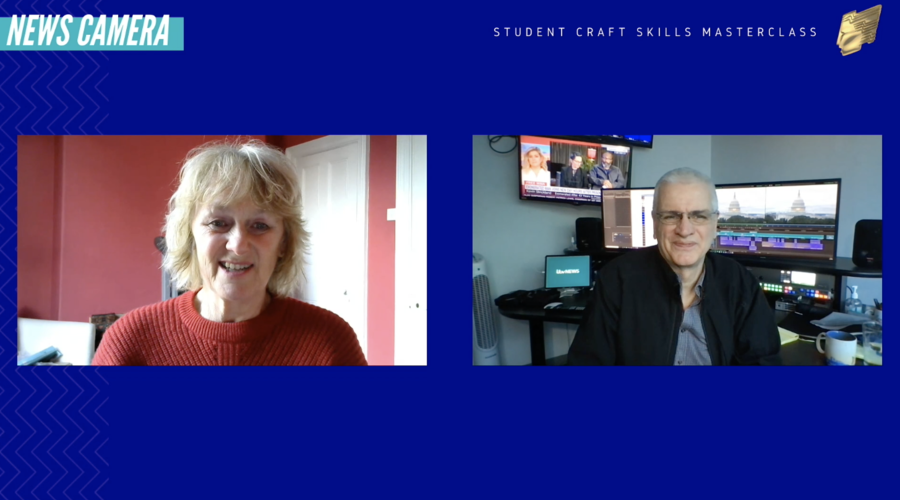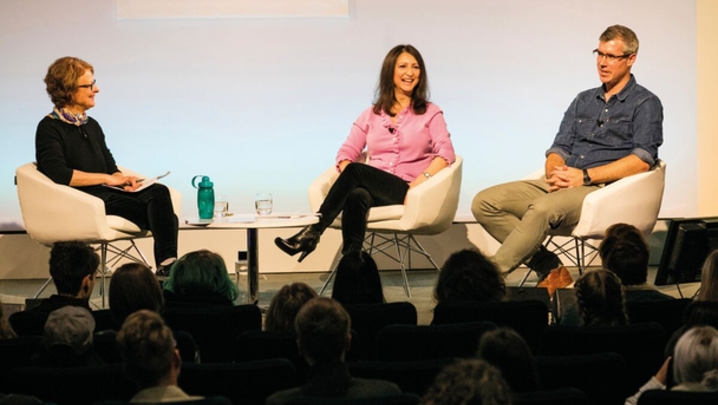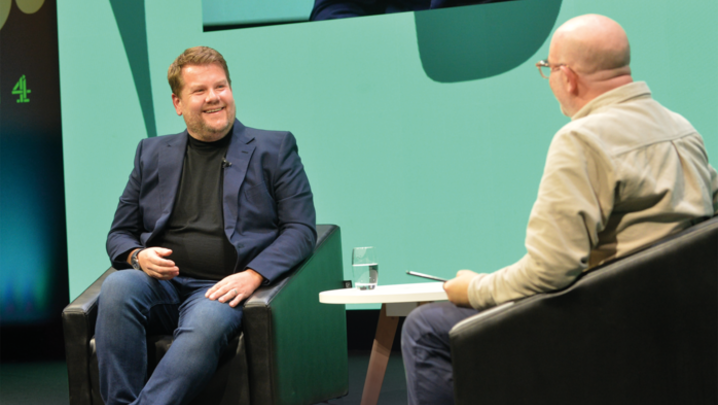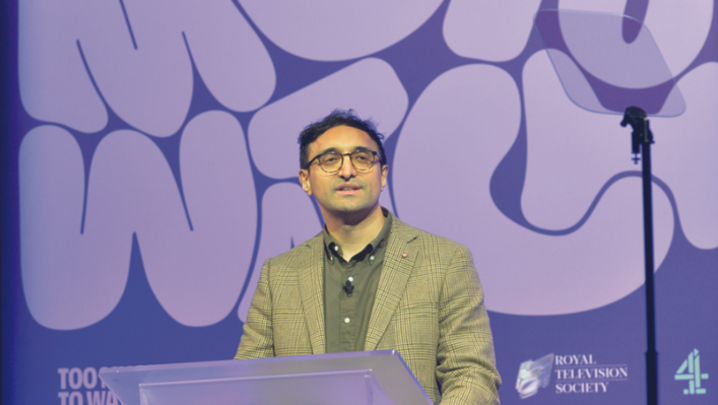Television distils a day of expert advice from leading TV practitioners at the RTS Craft Skills Masterclasses 2021.
NEWS CAMERA
Mark Davey is a camera operator at ITN. Presenting the news camera masterclass, he told the RTS audience that sound journalistic skills, the ability to form good relationships and a keen logistical sense were all essential for his job. Davey, ITN reporter Robert Moore and producer Sophie Alexander were the only news crew to film inside the US Capitol in January 2021, when pro-Trump insurrectionists stormed the building claiming that the presidential election had been stolen from them.
“We’ve been speculating ever since as to why we weren’t beaten up and my camera wasn’t broken,” said Davey. “One of the things that helped was Robert’s great gift for putting a microphone under someone’s nose and giving them an opportunity to speak.”
It also helped in this highly charged situation that they were an overseas news team: “I’m convinced that, had Fox News been there that day, they would have been lynched, because the rioters felt betrayed by Fox. CNN and MSNBC would also have struggled. They were beaten up outside and their cameras were destroyed.
“Our foreignness helped. I’ve joked that, because that day I was dressed like a Proud Boy, no one attacked us.”
Belfast-born Davey began his career at UTV and has covered conflicts in Northern Ireland, Iraq, Afghanistan, Syria, Israel and Lebanon.
ITN has a long tradition of blurring the lines between camera operator and journalist. “If my correspondent or producer gets a shot on their iPhone that is the opening shot of our piece, I have no problem with that,” he said. “In fact, I’m delighted. It’s a collective effort.”
He added: “Covering the Capitol riot, there was a long period that day when I was alone with Sophie, our producer. We were collectively making decisions. At no point was anyone in charge.”
CINEMATOGRAPHY
Diana Olifirova is an award-winning cinematographer who has to believe in the films that she works on. “For me, it’s important to be selective and only do things that you love,” she said. “You don’t do jobs solely for the money. It’s important to live and breathe the profession, and love it, because people can feel it in your work.
“It’s important to say no to things you don’t like. In the past, I’ve taken work I didn’t like and, as a result, became angry. Now, I only take on projects that I truly love.”
One of those projects was the recently recommissioned Channel 4 comedy We Are Lady Parts, the story of an all-Muslim female punk band, which won three prizes at this year’s RTS Craft & Design Awards. Olifirova was nominated for the Photography – Drama and Comedy prize at the RTS awards.
“It was challenging to work on because it was my first long-form project,” said Olifirova, who has worked on about 50 short films, including commercials and music promos.
An NFTS graduate, she won the British Society of Cinematographers’ Emerging Cinematographer Award for her work on the short film All of Me, directed by Daphne Schmon.
Nida Manzoor, the creator, writer and director of We Are Lady Parts had interviewed Olifirova for another project – which she didn’t end up working on – but remembered her. So, instead, she asked her to be the cinematographer on the Lady Parts pilot. When that was successful, she landed the series.
Good time-management was vital on a six-episode series such as We Are Lady Parts – “You could spend all day lighting or rehearsing,” she pointed out.
Cinematographers work closely with directors. “I always ask what they want first,” she explained. “I read the script, reflect on it and make notes. I also ask a lot of questions, including about the script. If, for example, the script says that someone feels anxious, I’ll think about how we can show it visually.”
Would she advise people to work for free when they are students? “No. I think it’s important to get paid when you are a trainee, otherwise people will take advantage of you. For passion projects, you can work for free, but always make sure they provide your travel expenses and your food.”
It was also important to overcome any shyness and build strong networks in the TV and film business: “I never felt comfortable introducing myself – I had to force it but, to get on, you’ve got to do it.”
SOUND
Nick Fry, head of audio at Soho facility The Farm, gave the sound masterclass. Sound in television, he said, “tells half the story” and is “often overlooked”, but added: “With the advent of Dolby Home Atmos and new audio formats, people are appreciating it a lot more and understanding that it really makes a big difference to the overall programme.”
Fry is a two-time winner of an RTS Craft & Design Award, for the sound on BBC Four documentary The Last Igloo, which tells the story of a disappearing way of life in the Arctic, and for Netflix factual series Formula 1: Drive to Survive.
The Last Igloo soundtrack uses natural sounds captured by a recordist on location, rather than stock sound effects and Foley (post-production) work. Fry explained: “[We were] trying to make the sound as authentic as possible, to do justice to the programme and subject.… I’m very proud of that work – it’s magical – the sound is really crisp and clean.”
He continued: “It’s a real bonus to have a sound recordist [on location] because it takes the sound up to another level. Yes, we can fix a lot of things now, we have a lot more tools at our disposal in sound post-production… but we want to be spending time being creative with the soundtrack rather than trying to rescue it.”
Sound specialists need both technical knowledge and creativity, as well as a “passion” for sound, said Fry, who advised: “Watch TV shows at home…. If you understand how a show is constructed, you’ll then understand how to mix the show.”
Students interested in sound post-production would be well advised to follow his route into the industry. “[Starting] as a runner… is still the best way – I’d treat it like an apprenticeship,” said Fry. At The Farm, he noted, “We offer training while you’re running…. So, when a position comes up as a soundtrack layer or sound editor, we can move them straight up.”
EDITING
Trace Taylor, who gave the editing masterclass, has worked on many award-winning series over the past 15 years, including Marcus Rashford: Feeding Britain’s Children, which recently garnered two RTS North West Awards.
“I fell into editing by accident,” she recalled, revealing that a film and television BTEC course had “ignited something inside me”. She added that editing “appeals to my introvert side – I get to spend a lot time on my own in a dark room”.
Having completed the BTEC, Taylor landed some work experience at a production company, which then offered her a role as a runner. This led to a job as a production assistant, until “one of the editors took me under his wing”. She later joined the BBC, before going freelance.
Discussing the Marcus Rashford documentary, Taylor said: “It was an honour and a privilege… to be involved in telling that story.” She used news clips, recreated tweets and interviews to immerse the viewer in the football player’s campaign to feed hungry children.
Taylor described the Channel 4 series SAS: Who Dares Wins as “one of the most challenging edits in my career… you feel like you’ve done an SAS challenge at the end of the edit”.
She recommended online tutorials as a means of getting to grips with the basics of editing: “Have some skills up your sleeve… before you do any course because going in with a bit of knowledge is really helpful.”
The professional body British Film Editors, she added, offered membership to students, and was a useful source of advice.
“Don’t be afraid to ask. As a woman, it’s very hard not to be usurped by your male colleagues – sometimes you have to put your head above the parapet and ask questions.”
Reports by Matthew Bell and Steve Clarke. The RTS Craft Skills Masterclasses were held on 24 November and chaired by Helen Scott (news camera), Ninder Billing (cinematography), Andrew Sheldon (sound) and Paul Bader (editing).







